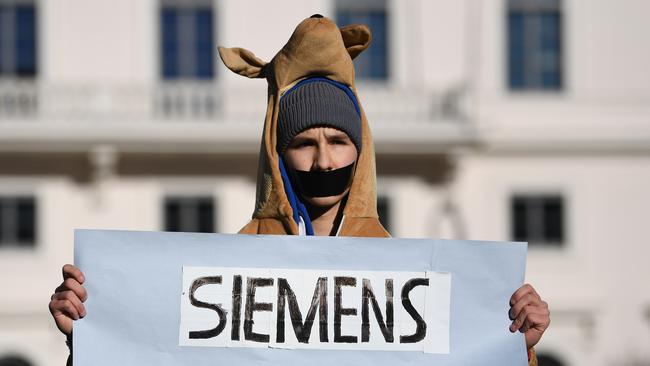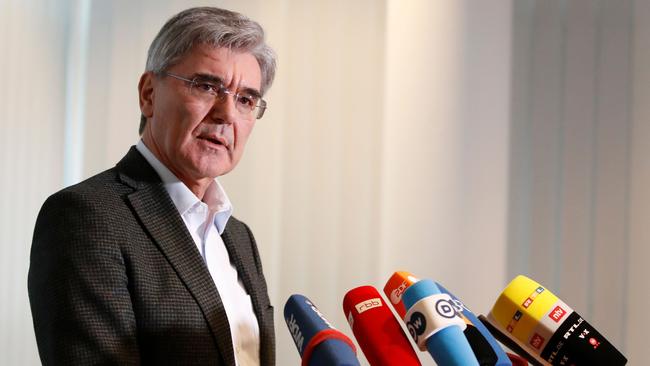Siemens sticks with Adani contract, despite protests
Campaigners vow to keep pressure on Siemens after the German giant said it would not walk away from its Adani rail contract.

Environmental campaigners have vowed to keep up the pressure on global industrial giant Siemens, saying the company’s decision to make good on a contract to supply rail signalling equipment to Adani’s Carmichael coal project was “shameful”.
The German-headquartered company said on Monday it would not bow to intense pressure to sever its relationship with Adani.
Siemens chief executive Joe Kaeser, in a statement the company’s website, said the company’s board had considered pulling out in light of the widespread criticism, but there was “practically no legally and economically responsible way to unwind the contract”.
Environmental activists staged protests in a dozen German cities on Friday, including outside Siemens’ Munich headquarters, calling for it to abandon the roughly $US20m ($30m) contract.
Climate activist Greta Thunberg had also called on Siemens to review its role in the controversial coal mine.
Mr Kaeser quoted a letter from federal Resources Minister Matt Canavan – who has previously described contractors who walked away from Adani as “bedwetters” – arguing the federal government’s May 2019 election victory was an endorsement of the Adani project.
Senator Canavan took to Twitter on Monday to welcome the decision, saying anti-Adani activists had used “reprehensible” tactics, including publishing the names of Siemens employees, to pressure the company.
“Great outcome for Aussie jobs, and a loss for the loud minority who try to bully others. One of the strategies used by the anti-job activists was to publish names and personal details of Siemens staff — so it’s particularly good that such reprehensible behaviour hasn’t paid off,” he said.
But local environmental activists vowed to keep up the pressure, saying opposition to the thermal coal mine now stretched across the world.
Australian Conservation Foundation senior campaigner Christian Slattery said Siemens’ decision was “shameful”.
“If constructed, the infrastructure for Adani’s mine will open the Galilee Basin to one of the largest expansions of thermal coal mining on the planet,” he said.
“Siemens claims to support the Paris Agreement, but now it is committed to work on one of the world’s biggest carbon bombs.”
The demonstrations in Germany by activists from Fridays for Future and Extinction Rebellion came as Australia’s bushfire crisis throws the nation’s coal exports and approach to climate policy into the international spotlight.
In the statement Mr Kaeser said he “may have acted differently” if he owned Siemens personally, but said Siemens had little choice.
“While I do have a lot of empathy for environmental matters, I do need to balance different interests of different stakeholders, as long as they have lawful legitimation for what they do,” he said.
“In this case, there is a legally binding and enforceable fiduciary responsibility to carry out this train signalling contract.
“There is factual clarity that the installation of our signalling system – and thereby making the already existing rail track safer – does not impact whether the coal mine will happen or not.”

Mr Kaeser defended Siemens’ environmental record, pointing to its decision to aim for carbon emission neutrality by 2030, and its involvement in renewable energy technology.
“At the same time, we – like all of you – feel with Australia, as it is facing this natural disaster at an unprecedented scale. And the people, who are affected by it, need help, not words,” he said.
“Therefore, I have directed our organisation in Australia to come up with a proposal how to support the reconstruction of destroyed infrastructure in the areas impacted by the terrible wildfires.”
Adani’s open-cut Carmichael mine is set to become operational next year and eventually produce up to 27 million tonnes of coal annually, although its first stage is planned at only 10 million tonnes a year.
A spokeswoman for Adani welcomed the decision.
“With construction of the Carmichael project well and truly underway we have repeatedly demonstrated that we will not be intimidated or deterred from delivering on our promises to regional Queenslanders, Australians and people in developing nations who desperately need affordable energy to help lift them out of poverty,” she said.
The troubled project, which has been scaled down since it was first announced, has run into repeated delays caused by legal and regulatory hurdles, as well as funding problems.
Supporters say the mine will bring hundreds of much-needed jobs to rural Queensland.
But conservationists say the project threatens local vulnerable species and means coal will have to be shipped from a port near the already-damaged Barrier Reef.
Additional reporting: AFP




To join the conversation, please log in. Don't have an account? Register
Join the conversation, you are commenting as Logout